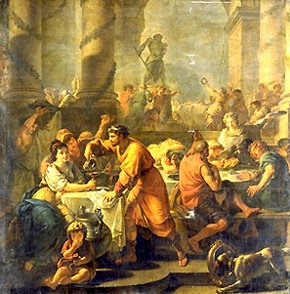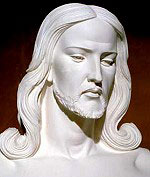
 Jesus was a Capricorn?
Jesus was a Capricorn?I'm going to go ahead and get this out of my system before Sunday and I apologize for having two posts in a row dealing with astrology.
My step-great-grandmother was wealthy and spent most of her days in one of her living rooms that was
 draped in purple velvet and had a big-ass picture of Jesus above the television. I know it sounds like something out of a Jeff Foxworthy skit, but it was actually all quite upper scale of gaudy.
draped in purple velvet and had a big-ass picture of Jesus above the television. I know it sounds like something out of a Jeff Foxworthy skit, but it was actually all quite upper scale of gaudy. One day in that room it hit me -- there was no possible way Jesus was a Capricorn and I started one of my typical quests for finding out the answer to something, because honestly, we Goats aren't exactly renowned for our vast depths of empathy. And for people that know astrology, the general belief is the same as mine -- no way could he have been born on December 25.....and here is why:
Back in the days when the ancient (4th century AD) Church Fathers were looking around for an official date to celebrate the birth of Jesus, they were also busily engaged in the very serious endeavor of "christianizing" ancient Rome.
 Ancient Romans conveniently happened to have a popular pagan holiday (holy day) season called "Saturnalia." Saturnalia, originally celebrated by the Romans each year on December the 17th, was a special day set apart for honoring the Roman god Saturn. This was a day for nostalgically remembering the "Golden Age" of Saturn's beneficent rule. Gifts were exchanged in remembrance of the bounty Saturn had once upon a time bestowed upon the Roman people. For the ancient Romans, Saturnalia was joyous celebration of "the good old days" when everything had "once-upon-a-time" been right in the world.
Ancient Romans conveniently happened to have a popular pagan holiday (holy day) season called "Saturnalia." Saturnalia, originally celebrated by the Romans each year on December the 17th, was a special day set apart for honoring the Roman god Saturn. This was a day for nostalgically remembering the "Golden Age" of Saturn's beneficent rule. Gifts were exchanged in remembrance of the bounty Saturn had once upon a time bestowed upon the Roman people. For the ancient Romans, Saturnalia was joyous celebration of "the good old days" when everything had "once-upon-a-time" been right in the world. At some point in time, the holy day of Saturnalia had also been tied into being a celebration of the rebirth of the Sun - and, as such, Saturnalia was held each year about the time of the "winter solstice." Each year, the winter solstice marks the beginning of winter. The winter solstice is the day each year having the longest night and the shortest amount of sunlight hours. After the winter solstice, the daylight hours slowly begin lasting longer and longer with each passing day, with this trend of increasing sunlight continuing on until the "summer solstice" in June. The summer solstice is marked as being the day with longest amount of daylight hours and is the official beginning of summer.
Anyway, the winter solstice takes place each year around December the 21st to mark the rebirth of the Sun. In 4th Century AD, the Roman emperor at the time "officially" reset Saturnalia to be celebrated on December the 25th (there appear to be varying and sometimes contradictory resources regarding exactly how and why all this happened).
Shortly thereafter, the Church Fathers likewise set the official date for celebrating the birth of Jesus as being December the 25th. What more appropriate day could the Church Fathers have "borrowed" for commemorating the birth of the Son, than the already extremely popular pagan holiday (Saturnalia) set apart for celebrating the rebirth of the true Sun?
It's interesting to note that when looked at on a purely symbolic level, the esoteric Church placed John the Baptist's birth on the Summer Solstice (decreasing sunlight) and Christ's birth on the Winter Solstice (increasing sunlight). This was meant to esoterically represent the New Testament scriptural passage where John the Baptist told his disciples that he (John) must decrease, while Jesus must increase.
So when was Jesus born and what did his birth symbolize?
Astrologers have been speculating about the birth of Christ for almost 2000 years now. However,
 there was at least one small group of ancient Babylonian astrologers who may have gotten it right.
there was at least one small group of ancient Babylonian astrologers who may have gotten it right.The "wise men" or "magi" that were following a star -- It's highly unlikely that there was any sort of supernova explosion in the sky that these "wise men" were following. According to the Gospel of Matthew, only the wise men were aware of the "star's" presence. Everyone else, knowing something special was going on, had been clued into the fact by angels (or by another source of divine revelation). Only the most closed minded person could possibly argue that these "wise men" from the East (following a star) were anything other than ancient Babylonian astrologers.
Based on biblical accounts and independent historical sources, the birth of Jesus most likely took place between the years of 8 BC and 4 BC. Beyond that we're forced back into the darker, murky waters of speculation… Many astrologers (dating back at least as far as Medieval times) have typically placed the year of Jesus' birth at 7 BC. 7 BC was a landmark year when the planets, Jupiter and Saturn, were "triple conjuncting" in the sign of Pisces.
This triple conjunction meant that Jupiter and Saturn repeatedly met up with each other in the sky three different times such a triple conjunction of Jupiter and Saturn is extremely rare, and it has not occurred again during the past 2000 years.
While this theory seems to be strong there are others including an astrological chart that shows Jesus' sign would be in Virgo - symbolic of being "born of the Virgin."
Things to make you go Hmmmmm....
Merry Christmas -- Joyeux Noel
No comments:
Post a Comment